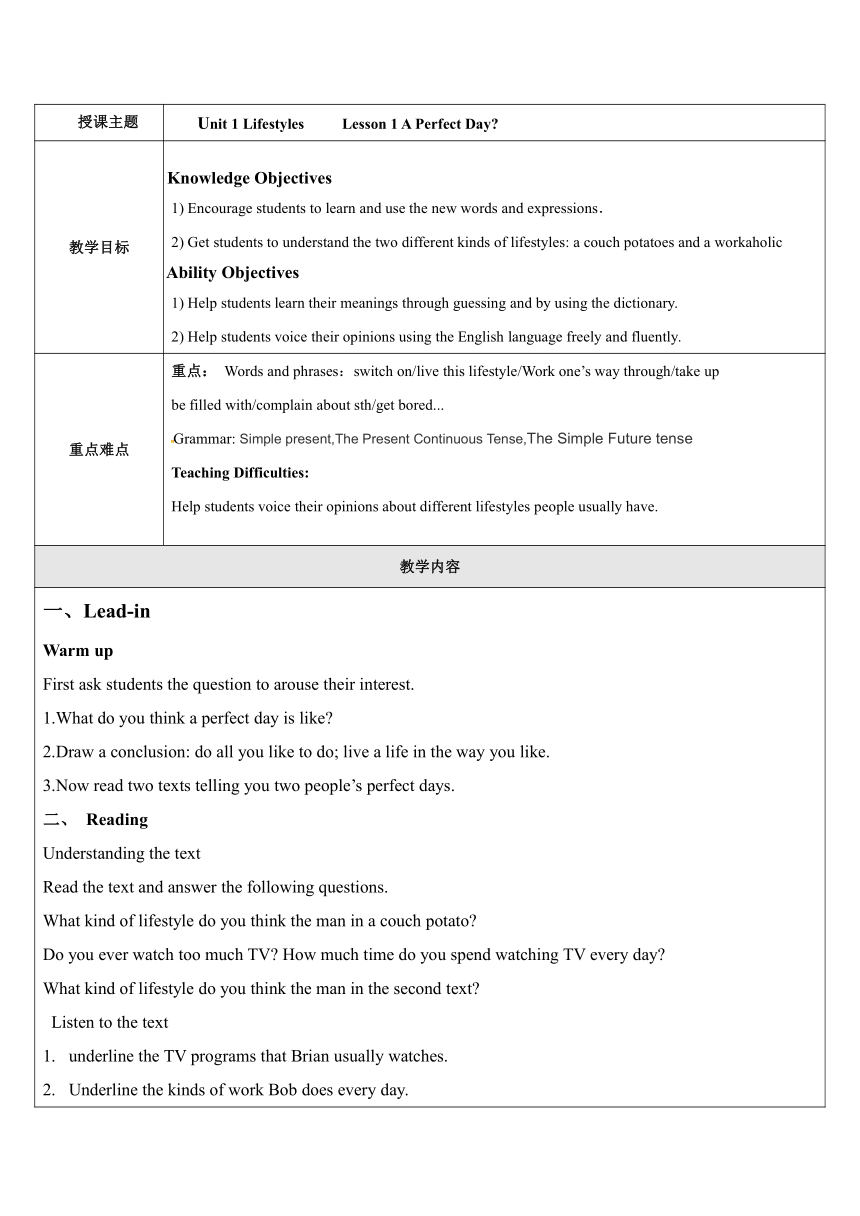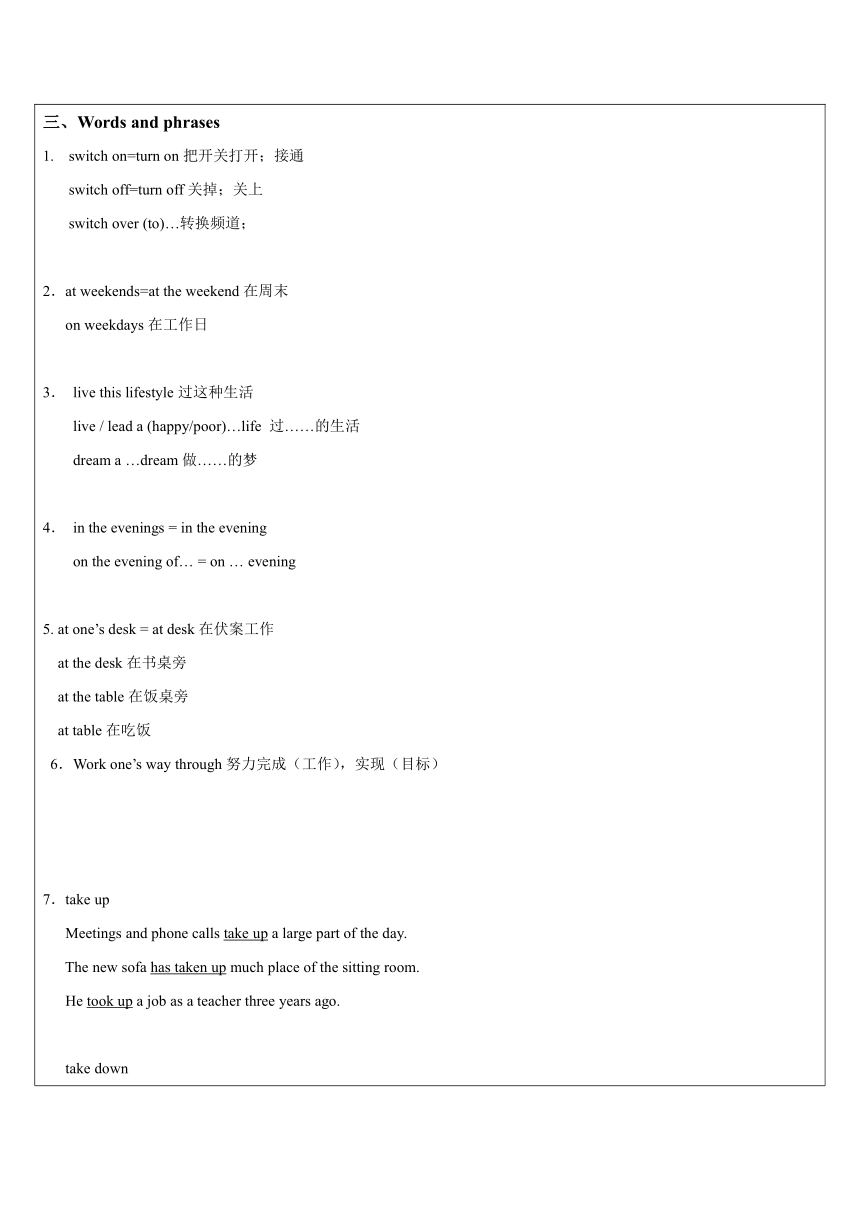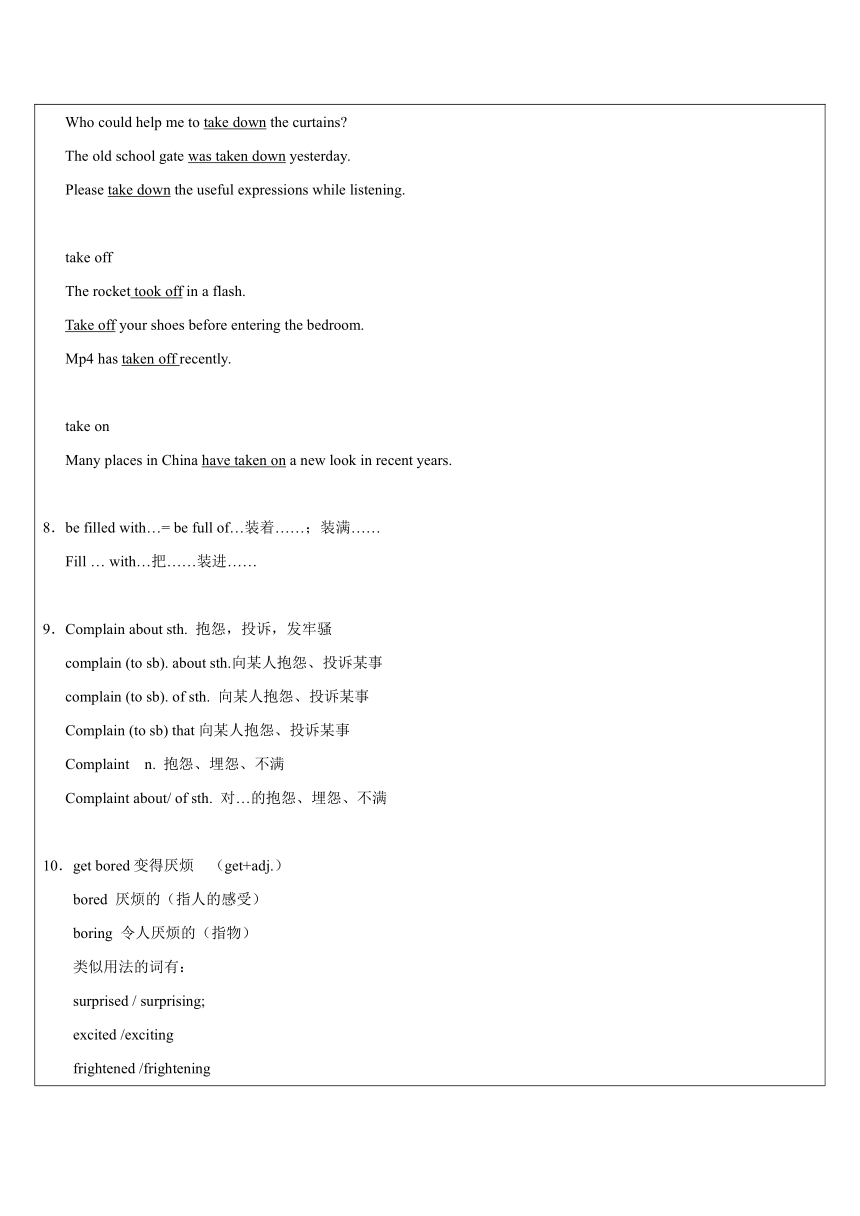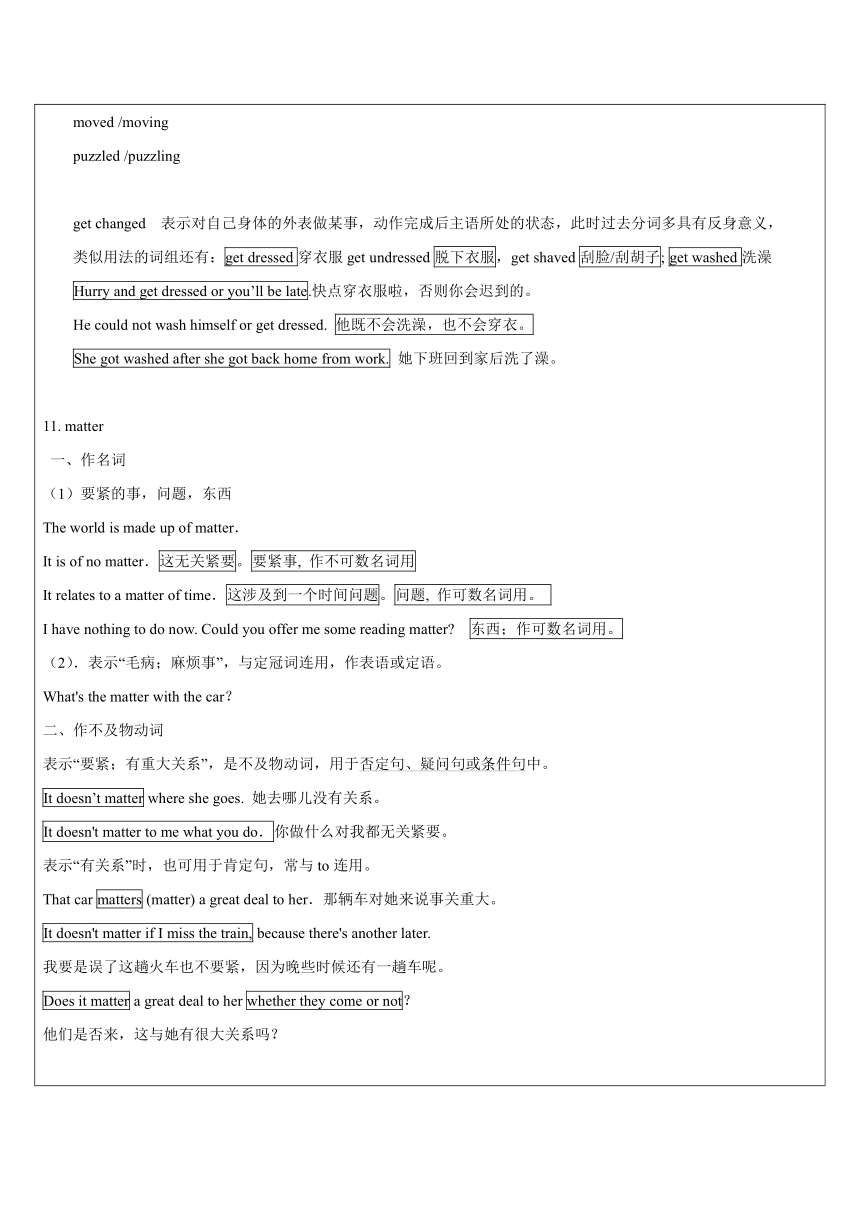高一英语北师大版必修一Unit 1 Lifestyles Lesson1同步教案(表格式)
文档属性
| 名称 | 高一英语北师大版必修一Unit 1 Lifestyles Lesson1同步教案(表格式) |

|
|
| 格式 | zip | ||
| 文件大小 | 25.0KB | ||
| 资源类型 | 教案 | ||
| 版本资源 | 北师大版 | ||
| 科目 | 英语 | ||
| 更新时间 | 2022-01-15 18:51:27 | ||
图片预览




文档简介
授课主题 Unit 1 Lifestyles Lesson 1 A Perfect Day
教学目标 Knowledge Objectives 1) Encourage students to learn and use the new words and expressions. 2) Get students to understand the two different kinds of lifestyles: a couch potatoes and a workaholic Ability Objectives 1) Help students learn their meanings through guessing and by using the dictionary. 2) Help students voice their opinions using the English language freely and fluently.
重点难点 重点: Words and phrases:switch on/live this lifestyle/Work one’s way through/take up be filled with/complain about sth/get bored... Grammar: Simple present,The Present Continuous Tense,The Simple Future tense Teaching Difficulties: Help students voice their opinions about different lifestyles people usually have.
教学内容
一、Lead-in Warm up First ask students the question to arouse their interest. 1.What do you think a perfect day is like 2.Draw a conclusion: do all you like to do; live a life in the way you like. 3.Now read two texts telling you two people’s perfect days. 二、 Reading Understanding the text Read the text and answer the following questions. What kind of lifestyle do you think the man in a couch potato Do you ever watch too much TV How much time do you spend watching TV every day What kind of lifestyle do you think the man in the second text Listen to the text underline the TV programs that Brian usually watches. Underline the kinds of work Bob does every day. 三、Words and phrases switch on=turn on把开关打开;接通 switch off=turn off关掉;关上 switch over (to)…转换频道; 2.at weekends=at the weekend在周末 on weekdays在工作日 3. live this lifestyle过这种生活 live / lead a (happy/poor)…life 过……的生活 dream a …dream做……的梦 4. in the evenings = in the evening on the evening of… = on … evening 5. at one’s desk = at desk在伏案工作 at the desk在书桌旁 at the table在饭桌旁 at table在吃饭 6.Work one’s way through努力完成(工作),实现(目标) 7.take up Meetings and phone calls take up a large part of the day. The new sofa has taken up much place of the sitting room. He took up a job as a teacher three years ago. take down Who could help me to take down the curtains The old school gate was taken down yesterday. Please take down the useful expressions while listening. take off The rocket took off in a flash. Take off your shoes before entering the bedroom. Mp4 has taken off recently. take on Many places in China have taken on a new look in recent years. 8.be filled with…= be full of…装着……;装满…… Fill … with…把……装进…… 9.Complain about sth. 抱怨,投诉,发牢骚 complain (to sb). about sth.向某人抱怨、投诉某事 complain (to sb). of sth. 向某人抱怨、投诉某事 Complain (to sb) that向某人抱怨、投诉某事 Complaint n. 抱怨、埋怨、不满 Complaint about/ of sth. 对…的抱怨、埋怨、不满 10.get bored变得厌烦 (get+adj.) bored 厌烦的(指人的感受) boring 令人厌烦的(指物) 类似用法的词有: surprised / surprising; excited /exciting frightened /frightening moved /moving puzzled /puzzling get changed 表示对自己身体的外表做某事,动作完成后主语所处的状态,此时过去分词多具有反身意义, 类似用法的词组还有:get dressed穿衣服get undressed脱下衣服,get shaved刮脸/刮胡子; get washed洗澡 Hurry and get dressed or you’ll be late.快点穿衣服啦,否则你会迟到的。 He could not wash himself or get dressed. 他既不会洗澡,也不会穿衣。 She got washed after she got back home from work. 她下班回到家后洗了澡。 11. matter 一、作名词 (1)要紧的事,问题,东西 The world is made up of matter. It is of no matter.这无关紧要。要紧事, 作不可数名词用 It relates to a matter of time.这涉及到一个时间问题。问题, 作可数名词用。 I have nothing to do now. Could you offer me some reading matter 东西;作可数名词用。 (2).表示“毛病;麻烦事”,与定冠词连用,作表语或定语。 What's the matter with the car? 二、作不及物动词 表示“要紧;有重大关系”,是不及物动词,用于否定句、疑问句或条件句中。 It doesn’t matter where she goes. 她去哪儿没有关系。 It doesn't matter to me what you do.你做什么对我都无关紧要。 表示“有关系”时,也可用于肯定句,常与to连用。 That car matters (matter) a great deal to her.那辆车对她来说事关重大。 It doesn't matter if I miss the train, because there's another later. 我要是误了这趟火车也不要紧,因为晚些时候还有一趟车呢。 Does it matter a great deal to her whether they come or not? 他们是否来,这与她有很大关系吗? 12. Suppose认为、认定、假定、猜想 Suppose sb./sth. (to be)+adj./名词短语 Everyone suppose him (to be) poor, but he is really rich. 大家都认为他很穷,实际上他很富有。 13. go off The alarm clock went off at 6:00 and woke me. (闹钟)响 The gun went off by accident. (枪)开火 A few minutes later the bomb went off, destroying the building. 爆炸 Don’t go off with saying goodbye. 离开 四、Sentence structure It takes sb. time to do sth.某人花……时间做某事 It takes me less than fifteen minutes to wash dishes everyday. 每天我最多花15分钟洗碗。 It takes me five minutes to go to school by bike. 我骑自行车上学需要5分钟时间。 Sb. spend time (in) doing sth Sb. spend time on sth. He spent the whole morning in reading the report. (read) Most of her life was spent in caring for other. (care for) I spent a whole day painting the room. 我用了一整天的时间粉刷那间房子。 Sth. cost sb. sth. The sweater cost me 50 yuan. I am always the first person to get to the office. be + the + 序数词+名词+to do sth. 第几个……做某事 She is always the first person to get to school everyday in our classroom. 在我们班她总是第一个人回到学校的人。 五 Grammar 1. 一般现在时 (1)主要用于表示人、事物现在状况和特点;表示经常或习惯性的动作,句中常有often, always, from time to time 等时间状语;表示客观规律和永恒真理等。 He usually goes to work at 7 o’clock every morning. The earth goes around the sun. (2)表示永恒的真理,即使过去的语境中,仍用一般现在时。 I learned that the earth goes around the sun when I was in primary school. 我在小学就知道地球围绕太阳转。 (3)在时间、条件和让步状语从句中,用一般现在时表将来。 If he accepts the job, he will get more money soon. (4)在the more… the more… (越......越......)句型中,若主句是一般将来时,从句通常用一般现在时。 The harder you study, the better results you will get. 你学习越用功,成绩就越好。 2. 现在进行时的基本用法: a. 表示现在( 指说话人说话时) 正在发生的事情。 We are waiting for you. b. 习惯进行:表示长期的或重复性的动作,说话时动作未必正在进行。 Mr. Green is writing another novel. (说话时并未在写,只处于写作的状态。) She is learning piano under Mr. Smith. c. 表示渐变的动词有:get, grow, become, turn, run, go, begin等。 The leaves are turning red. It's getting warmer and warmer. d. 与always, constantly, forever 等词连用,表示反复发生的动作或持续存在的状态,往往带有说话人的主观色彩。 You are always changing your mind. 典型例题 My dictionary ___, I have looked for it everywhere but still___ it. A. has lost, don't find B. is missing, don't find C. has lost, haven't found D. is missing, haven't found. 答案D. 前句是一个仍在持续的状态,应用进行时,由于没有找到,其影响仍然存在,应用完成时,瞬间动词用于否定式时可用于完成时。 六、课堂练习 一、用括号中动词的适当形式填空。 1. He (go) to the park on Sundays. 2. they (like) China 3. Lucy (not like) meat at all. 4. The students (have) an English class every day. 5. your father (speak) French well No, he 6. My grandpa often (watch) TV in the evening. 7. If I (have) time tomorrow, I (go) with you. 8. Please (tell) her as soon as you (see) her tomorrow. 9. Miss Gao (not have) lunch at school. She (have) it at home. 10. Tom often (do) his homework at the table. ~~~~~~~~~~~~~~~~~~~~~~~~~~~~~~~~~~~~~~~~~~~~~~~~~~~~~~~~~~~~~~~
教学目标 Knowledge Objectives 1) Encourage students to learn and use the new words and expressions. 2) Get students to understand the two different kinds of lifestyles: a couch potatoes and a workaholic Ability Objectives 1) Help students learn their meanings through guessing and by using the dictionary. 2) Help students voice their opinions using the English language freely and fluently.
重点难点 重点: Words and phrases:switch on/live this lifestyle/Work one’s way through/take up be filled with/complain about sth/get bored... Grammar: Simple present,The Present Continuous Tense,The Simple Future tense Teaching Difficulties: Help students voice their opinions about different lifestyles people usually have.
教学内容
一、Lead-in Warm up First ask students the question to arouse their interest. 1.What do you think a perfect day is like 2.Draw a conclusion: do all you like to do; live a life in the way you like. 3.Now read two texts telling you two people’s perfect days. 二、 Reading Understanding the text Read the text and answer the following questions. What kind of lifestyle do you think the man in a couch potato Do you ever watch too much TV How much time do you spend watching TV every day What kind of lifestyle do you think the man in the second text Listen to the text underline the TV programs that Brian usually watches. Underline the kinds of work Bob does every day. 三、Words and phrases switch on=turn on把开关打开;接通 switch off=turn off关掉;关上 switch over (to)…转换频道; 2.at weekends=at the weekend在周末 on weekdays在工作日 3. live this lifestyle过这种生活 live / lead a (happy/poor)…life 过……的生活 dream a …dream做……的梦 4. in the evenings = in the evening on the evening of… = on … evening 5. at one’s desk = at desk在伏案工作 at the desk在书桌旁 at the table在饭桌旁 at table在吃饭 6.Work one’s way through努力完成(工作),实现(目标) 7.take up Meetings and phone calls take up a large part of the day. The new sofa has taken up much place of the sitting room. He took up a job as a teacher three years ago. take down Who could help me to take down the curtains The old school gate was taken down yesterday. Please take down the useful expressions while listening. take off The rocket took off in a flash. Take off your shoes before entering the bedroom. Mp4 has taken off recently. take on Many places in China have taken on a new look in recent years. 8.be filled with…= be full of…装着……;装满…… Fill … with…把……装进…… 9.Complain about sth. 抱怨,投诉,发牢骚 complain (to sb). about sth.向某人抱怨、投诉某事 complain (to sb). of sth. 向某人抱怨、投诉某事 Complain (to sb) that向某人抱怨、投诉某事 Complaint n. 抱怨、埋怨、不满 Complaint about/ of sth. 对…的抱怨、埋怨、不满 10.get bored变得厌烦 (get+adj.) bored 厌烦的(指人的感受) boring 令人厌烦的(指物) 类似用法的词有: surprised / surprising; excited /exciting frightened /frightening moved /moving puzzled /puzzling get changed 表示对自己身体的外表做某事,动作完成后主语所处的状态,此时过去分词多具有反身意义, 类似用法的词组还有:get dressed穿衣服get undressed脱下衣服,get shaved刮脸/刮胡子; get washed洗澡 Hurry and get dressed or you’ll be late.快点穿衣服啦,否则你会迟到的。 He could not wash himself or get dressed. 他既不会洗澡,也不会穿衣。 She got washed after she got back home from work. 她下班回到家后洗了澡。 11. matter 一、作名词 (1)要紧的事,问题,东西 The world is made up of matter. It is of no matter.这无关紧要。要紧事, 作不可数名词用 It relates to a matter of time.这涉及到一个时间问题。问题, 作可数名词用。 I have nothing to do now. Could you offer me some reading matter 东西;作可数名词用。 (2).表示“毛病;麻烦事”,与定冠词连用,作表语或定语。 What's the matter with the car? 二、作不及物动词 表示“要紧;有重大关系”,是不及物动词,用于否定句、疑问句或条件句中。 It doesn’t matter where she goes. 她去哪儿没有关系。 It doesn't matter to me what you do.你做什么对我都无关紧要。 表示“有关系”时,也可用于肯定句,常与to连用。 That car matters (matter) a great deal to her.那辆车对她来说事关重大。 It doesn't matter if I miss the train, because there's another later. 我要是误了这趟火车也不要紧,因为晚些时候还有一趟车呢。 Does it matter a great deal to her whether they come or not? 他们是否来,这与她有很大关系吗? 12. Suppose认为、认定、假定、猜想 Suppose sb./sth. (to be)+adj./名词短语 Everyone suppose him (to be) poor, but he is really rich. 大家都认为他很穷,实际上他很富有。 13. go off The alarm clock went off at 6:00 and woke me. (闹钟)响 The gun went off by accident. (枪)开火 A few minutes later the bomb went off, destroying the building. 爆炸 Don’t go off with saying goodbye. 离开 四、Sentence structure It takes sb. time to do sth.某人花……时间做某事 It takes me less than fifteen minutes to wash dishes everyday. 每天我最多花15分钟洗碗。 It takes me five minutes to go to school by bike. 我骑自行车上学需要5分钟时间。 Sb. spend time (in) doing sth Sb. spend time on sth. He spent the whole morning in reading the report. (read) Most of her life was spent in caring for other. (care for) I spent a whole day painting the room. 我用了一整天的时间粉刷那间房子。 Sth. cost sb. sth. The sweater cost me 50 yuan. I am always the first person to get to the office. be + the + 序数词+名词+to do sth. 第几个……做某事 She is always the first person to get to school everyday in our classroom. 在我们班她总是第一个人回到学校的人。 五 Grammar 1. 一般现在时 (1)主要用于表示人、事物现在状况和特点;表示经常或习惯性的动作,句中常有often, always, from time to time 等时间状语;表示客观规律和永恒真理等。 He usually goes to work at 7 o’clock every morning. The earth goes around the sun. (2)表示永恒的真理,即使过去的语境中,仍用一般现在时。 I learned that the earth goes around the sun when I was in primary school. 我在小学就知道地球围绕太阳转。 (3)在时间、条件和让步状语从句中,用一般现在时表将来。 If he accepts the job, he will get more money soon. (4)在the more… the more… (越......越......)句型中,若主句是一般将来时,从句通常用一般现在时。 The harder you study, the better results you will get. 你学习越用功,成绩就越好。 2. 现在进行时的基本用法: a. 表示现在( 指说话人说话时) 正在发生的事情。 We are waiting for you. b. 习惯进行:表示长期的或重复性的动作,说话时动作未必正在进行。 Mr. Green is writing another novel. (说话时并未在写,只处于写作的状态。) She is learning piano under Mr. Smith. c. 表示渐变的动词有:get, grow, become, turn, run, go, begin等。 The leaves are turning red. It's getting warmer and warmer. d. 与always, constantly, forever 等词连用,表示反复发生的动作或持续存在的状态,往往带有说话人的主观色彩。 You are always changing your mind. 典型例题 My dictionary ___, I have looked for it everywhere but still___ it. A. has lost, don't find B. is missing, don't find C. has lost, haven't found D. is missing, haven't found. 答案D. 前句是一个仍在持续的状态,应用进行时,由于没有找到,其影响仍然存在,应用完成时,瞬间动词用于否定式时可用于完成时。 六、课堂练习 一、用括号中动词的适当形式填空。 1. He (go) to the park on Sundays. 2. they (like) China 3. Lucy (not like) meat at all. 4. The students (have) an English class every day. 5. your father (speak) French well No, he 6. My grandpa often (watch) TV in the evening. 7. If I (have) time tomorrow, I (go) with you. 8. Please (tell) her as soon as you (see) her tomorrow. 9. Miss Gao (not have) lunch at school. She (have) it at home. 10. Tom often (do) his homework at the table. ~~~~~~~~~~~~~~~~~~~~~~~~~~~~~~~~~~~~~~~~~~~~~~~~~~~~~~~~~~~~~~~
